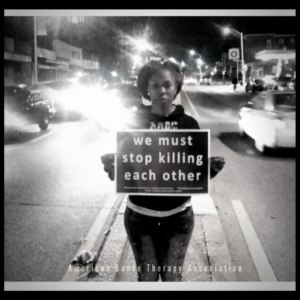VIOLENCE AGAINST BLACK MEN POSITION STATEMENTIntroduction from the Executive Committee of the ADTA The members of the ADTA Executive Committee offer the following statement created by our colleagues in the Black American and African Descendants (BAAD) Affinity Group. We stand with them in absolutely denouncing gun violence against Black men, in particular violence perpetrated by law enforcement. Such disproportionate violence sows daily fear, mistrust and, for some, symptoms of traumatic disorders. As dance/movement therapists, we are aware of the impact this has on the mental health and wellbeing of many of our members as well as the communities we serve. We cannot remain silent on an issue of such profound social justice. This statement is shared by the voices within our ADTA community most impacted by the violence against Black men and we honor the lived experience of our colleagues and deeply appreciate the clarity and vulnerability of their sharing. With deep respect, The Executive Committee of the ADTA
Dear ADTA members, The ADTA has been ask to address the unexplained and inhuman gun violence against Black men across the United States. We are stepping up and stepping back by asking members of the BAAD affinity group to share their voice. Black DMTS and Black ADTA members reported that the effects on the black community from unexplained and inhuman gun violence are such as being fearful of their lives, fear and mistrust of law enforcement, the oppressing and violent nature of the society we live in and having to be hyper vigilant of “the white man” is not illusion but a reality. Clinicians need to support Black men and their communities in expanding their view of themselves as well, as it will provide them more opportunities and options to grow and navigate their lives. Lastly being a witness to a black man being harmed or killed on television can be equally traumatic to someone who is being harmed or killed for being black in real time. As dance/movement therapists, we are aware of the trauma and likely long-term consequences associated with post traumatic stress and it is equally important to acknowledge some of the symptoms that arise from post traumatic slave syndrome that often go unrecognized. As a profession that seeks to heal and help our communities, it is important that we take a strong position against violence, oppression and degradation against anyone based on the color of their skin, language they speak, cultural identity and/or sexual orientation/gender identity. Reflected in our Code of Ethics, this stance is a core principle of ADTA belief and behavior. 6.0: Dance/movement therapists promote social justice with a recognition that a just society contributes to individual, family, and community health. 6.0.a: Dance/movement therapists cultivate awareness of and address oppression and disparities in power and privilege, resulting in barriers to wellness, at individual, institutional, and societal levels. Dance/movement therapists advocate for equitable access to services and culturally competent care. As we continue the conversation around our conference Keynote of Power and Privilege, if you see ways that the ADTA can be of support to our members that are people of color, please contact leader of the Allies for Social Justice group, Melody Gamba, [email protected] . If you are a person of color who wants to get involved, please contact, Charne Furcon, [email protected] at in relation to the Multicultural Diversity Committee. We want more of our members passionate about this topic to get involved. We sincerely want to hear from you – especially from those voices that do not feel representation in the community. “No label, no slogan, no party, no skin color, and no religion is more important than the human being.” – James Baldwin With Respect, Love and Hope for Change BAAD Affinity Group The American Dance Therapy Association ReferencesDeGruy, J., Dr. (2005) Post Traumatic Slave Syndrome: America’s Legacy of Enduring Injury and Healing, Published by: Uptone Press. DeGruy, J., Dr. (2005). SpeakOutNow: Voices Change Live Campbell, B. (2018). Past, Present, Future: A Program Development Project exploring Post Traumatic Slave Syndrome (PTSS) using experiential education and dance movement therapy informed approaches (Masters Thesis). Love, D. (2016). Post-Traumatic Slave Syndrome and Intergenerational Trauma: Slavery is Like a Curse Passing Through the DNA of Black People. Blades, L. A. (2017). Trauma From Slavery Can Actually Be Passed Down Through Your Genes Goodman,R. D.(2013) The transgenerational trauma and resilience genogram, Counselling Psychology Quarterly 1/10/2019 |


